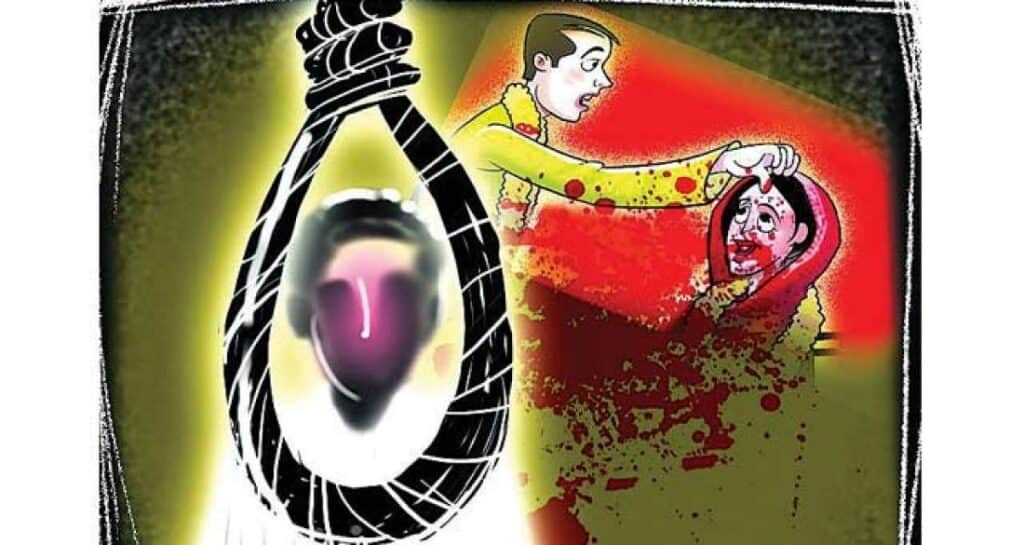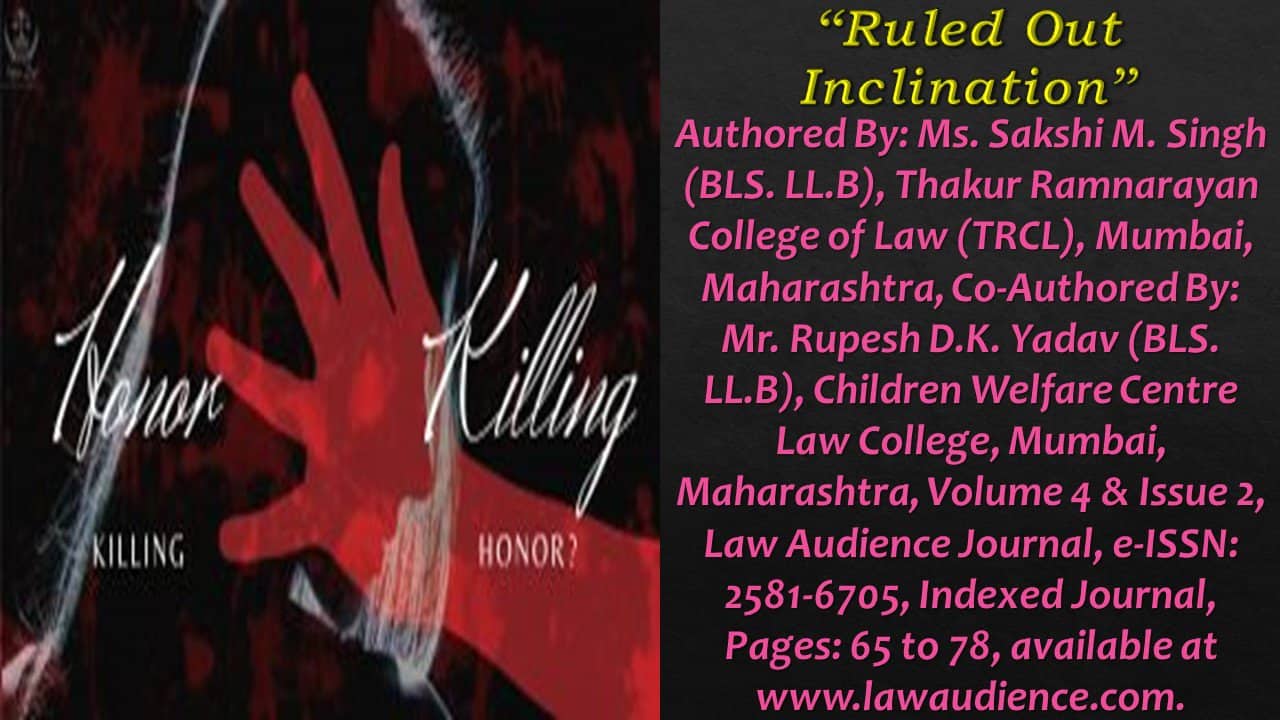Click here to download the full paper (PDF)
Authored By: Ms. Sakshi M. Singh (BLS. LL.B), Thakur Ramnarayan College of Law (TRCL), Mumbai, Maharashtra, Co-Authored By: Mr. Rupesh D.K. Yadav (BLS. LL.B), Children Welfare Centre Law College, Mumbai, Maharashtra,
Click here for Copyright Policy.
ABSTRACT:
“The phrase “Honour Killing” is useful because it cushions the impact and does not characterize the person who commits the crime as a criminal but rather as a merely defender of the “Honour”. Also known as “Customary Killing”, a term that shields the perpetrator from the repercussions of their heinous crime, which is essentially an extreme violation of the fundamental human right to life Killing someone is always immoral, illegal and a serious violation of human rights. It is illegal to kill someone for no purpose or reason.
It is also unconstitutional and violates the law. The Constitution guarantees the right to life and dignity of all citizens. Honour is intact with life. This right is enshrined as a fundamental right under the Indian constitution. Each and every one of us has the right to protection from any menace to our lives. Everyone has the authority to make their own decisions. The fundamental right under the Indian constitution includes the right to express one’s views as well. Therefore, the right to marry and the freedom to select one’s spouse are likewise covered by the right to life. Pressures from society and culture cannot violate the right to live in society in a dignified manner.
However, the law has made provisions to combat with these inappropriate traditions, making it illegal to kill for the sake of family honour. The paper aims to demonstrate the social as well as the legal and judicial side of the issue that needs to be dealt. Killing someone will never ever replace or redeem the so-called lost honour; rather, this conduct constitutes murder. It continues by explaining the psychology behind a family member committing such a horrendous crime. The social, economic, political, and cultural sensitization against the crime is equally crucial as keeping an eye on the legal vendetta. Before we challenge the bodies that commit these killings with pride, patriarchal mindsets must first be challenged”.
Keywords: Violence, Honour, Dishonour, Illegal, Legal Rights, Patriarchal Society.
“HAMARE GHAR KI IZZAT”
I think this phrase is sufficient to
explain the root cause of this heinous crime.
HONOUR KILLING:

I. INTRODUCTION:
Intentional murder or an act of vengeance committed against a family member because the perpetrators believe the victim has brought shame or dishonour upon the family, or has transgressed the morals of a community or a religion, is known as an honour killing or shame killing. Honour killing is frequently also referred to as the acts of vengeance, usually death, committed by family members against female family members, though it has been noted that this practice targets both male and female members of the families that practice this culture. To conveniently find a place within the context for the defence of their own moral integrity, this haphazard murder has been classified as a “Culture Crime.” Disobeying the dress code prescribed by the community for females, refusing to arrange marriage, marrying someone outside of one’s caste or religion, being in lesbian or gay relationships, or engaging in premarital or extramarital sexual activity, whether consensual or not, are the main causes of honour killings.
Note:
“When it comes to honour killings, the question of whether the act actually restores the family’s honour or merely makes matters worse should be taken into consideration. Determining whether tribe or family’s honour is so essential that it renders people blind and deaf to the sentiments and emotions of their own members, that is another crucial factor that has to be assessed”.
II. DEFINITION OF HONOUR KILLING:
According to Human Rights Watch, “honour killings” is an act of violence , generally murder, carried out by male family members against female family members who are believed to have thrown the family’s honour into disrepute. For a number of reasons, including: refusing to join into an arranged marriage, experiencing sexual assault, requesting a divorce—even from an abusive husband—or (supposedly) engaging in adultery, a woman may come under the scrutiny of her family. A woman’s life can be attacked just for the idea that she has acted in a way that “dishonours” her family. As a result, one definition of an “honour killing” (also known as a “customary killing”) is “the murdering of a member of a family or social group by other members because of the offenders’ conviction.” (And even to a larger portion of the community) that the victim has brought shame to the family or society. Consequently, a murder done to protect something that is valued in a particular way. Honour killing refers to the “honour” of one’s family against the dishonour brought on by another family member.
III. HONOUR KILLING IN INDIA:
Honour killing, also known as shame killing, is an act of humiliation committed against the family. When a person refuses to accept an arranged marriage, marries a person whom the family disapproves of them, or enters into an inter caste marriage against the wishes and will of their family, this is considered an act of murder. This kind of murder has been practiced for generations in India. It has been a tradition since the past. For our society, it has turned a standard procedure. The Supreme Court issued a ruling on honour killings stating that it is unlawful to kill or physically assault young people who marry without the will of their families. It is a horrible and inhumane act for a family member to kill in this manner.
However, honour killing is now a separate crime in our nation with harsh penalties. Honour killing is a more common practice in India, particularly in the states of Punjab, Uttar Pradesh, Haryana, and Rajasthan. The crime of honour killing is becoming more well known as a result of the complicated sociocultural issues. The intention of this murder is to restore their honour, which has been damaged because of the young man or woman’s action, honour killing is a practice in India. Honour killing is a crime that has largely equalled other severe crimes. The young male or female who has been raised by the family for years must also be taken into consideration by the family, even though culture is vital. The family members do not get the same level of importance as culture and reputation gets. They think about the thoughts of society, neighbours, rumours and news stories about the victim and get triggered to commit honour killing, but they do not seek out a solution to protect the victim. This crime is now ubiquitous in our nation.
IV. REASONS FOR HONOUR KILLING:
The primary justification for committing an “honour killing” is the conviction that a family member has defamed the family. For many families, the dishonour might take many different forms. The perceived dishonour is typically the result of the following behaviours, or the suspicion of such behaviours, including dress codes that are unacceptable to the family or community, wanting to end or prevent an arranged marriage, wanting to marry of one’s own choosing, engaging in specific sexual acts, including those with the opposite or same sex, etc. The caste system’s continued rigidity and the refusal of people from rural areas to adjust their views on marriage are the two most evident reasons why this practice will likely continue in India. Additionally, our nation’s society is predominately patriarchal. Men are supposed to uphold these standards and customs and guard against dishonour to the family and the masculine honour. Women are supposed to act honourably at all times. This interpretation of the idea offers validity to all social controls on women’s behaviour as well as to violence against them.
V. A WOMAN OR A MALE MEMBER CAN BE TARGETED BY HER FAMILY OR OTHER MEMBERS OF THE SOCIETY FOR ANY OF THESE RECOGNIZED REASONS:
V.I MARRYING AGAINST THE WISHES OF THE FAMILY:
A young couple who gets married against the advice of community or family members and on their own terms. Or the refusal to participate in a family-arranged marriage that would bring embarrassment if not betrothed.
V.II FOR SEEKING DIVORCE OR SEPARATING FROM SPOUSE:
Marriage is seen as a holy tie in various cultures, including our own, and is expected to be upheld for both this life and the following reincarnations. Separation or divorce requests are therefore viewed as actions that bring disgrace to the family in the eyes of the community. Contrary to her husband’s or the elders in the family’s wishes, a woman’s desire for a divorce is frequently viewed as an insult to the man because, by doing so, she is bringing shame to the family by disclosing their marital issues to the world.
V.III HAVING PREMARITAL OR EXTRAMARITAL SEX:
Controlling someone else’s decisions or behaviour, especially in relation to their sexual orientation and marital status, is the main characteristic of this crime. A woman who engages in premarital sex is therefore degrading her family’s social status. The mere suggestion or notion that a woman may have engaged in extramarital sex (adultery) is enough of a catalyst to permit an attack on her life. In such honour-based cultures, a woman upholds her and her family’s honour through modesty, and if a man violates this modesty by dating her, having sex with her, or, in some cultures, even just talking with consent, the family members feel it is their duty to restore this lost honour by using violence against the woman, the man, and even his family—violence that frequently results in mass murders that cause generations of family strife.
V.IV VICTIM OF A SEXUAL ASSAULT OR RAPE:
Due to the stigma or dishonour they have brought on their family; rape victims are shunned by their cultures. Additionally, honour killing has been viewed as a widespread practise throughout much of the world if the victim becomes pregnant.
V.V BEING PART OF BEHAVIOURS THAT MAY BE DEEMED INAPPROPRIATE:
Honour killing may also arise from dressing in a way that offends family members or giving up a professed religion. A woman was murdered by her father in Saudi Arabia in 2008 for “chatting” with a man on Facebook. Only after a Saudi cleric brought up the assassination in an attack on Facebook for the unrest it had generated did the killing come to light. Even then, Facebook was regarded as inappropriate rather than the killing because it was a social networking platform.
V.VI HOMOSEXUALITY:
Until recently, homosexuality was illegal in India, as it is still today in many other countries. As a result, the conduct of this unlawful crime readily justifies the society enacting its own version of justice by murdering a person who engaged in sex with a person of the same sex. For this reason, men have been shown to be the victims of this hate crime more frequently. It is also believed that inappropriate gender expressions, such as a man acting or wearing in a “feminine fashion,” can result in honour-based violence.
There are a few easily obvious characteristics of this type of covert gender abuse that help people identify this Honour Crime. The murders are widespread In order to eliminate these offenders who are perceived as disruptors of peace in their close-knit communities and who carry with them negative stigmas, nature, i.e., a “family council,” is formed, and many different members of the family work together. The victim of the violence is a woman’s autonomy over her sexuality and marriage, not the woman herself.
VI. INDIAN LEGAL FRAMEWORK:
VI.I PENALTIES UNDER INDIANPENALCODE:
VI.I.I SECTIONS 299-304:
A person who commits murder or culpable homicide that does not amount to murder is punished under this provision. Murder is punishable by a life sentence, the death penalty, or both. The penalty for culpable homicide that does not constitute murder is life in prison or a maximum of 10 years’ imprisonment, as well as a fine.
VI.I.II SECTION 307:
The attempt to commit murder is punishable under this provision of the IPC by a fine and a prison sentence of up to 10 years. If harm is done to a person as a result of the attempted murder, the offender could receive a life sentence.
VI.I.III SECTION 308:
In this provision, attempting to commit culpable homicide is punishable by up to 3 years in imprisonment, a fine, or both. If it causes hurt, the culprit shall be imprisoned for up to 7 years or fine or both.
VI.I.IV SECTION 120A AND B:
These sections define criminal conspiracy as a crime and specify how it will be punished. If two or more people conspire to do anything unlawful or legal through illegal methods and they do so, this is referred to as a criminal conspiracy.
VI.I.V SECTIONS 107-116:
This section imposes penalties for those who abet crimes including culpable homicide and murder.
VI.I.VI SECTION 34 AND 35:
According to this Provision, crimes committed by multiple people to achieve a common target are punishable.
VI.I.VII SECTION 300:
This section talks about murder; culpable homicide is murder if it is done with the intention of causing death. So, when a person is killed because of the reason that he has brought drawn the honour of the family, then the ones who have killed him can be punished Under section 300 of IPC, as they did that act intentionally
VI.II FUNDAMENTAL AND CONSTITUTIONAL RIGHTS:
The Indian Constitution contains many articles that guarantee an individual’s freedom of expression regardless of caste, religion, or gender as well as protection from crimes involving honour, such as honour killings. Such murders also contravene Articles. Due to this crime, there are some laws that have been violated. Articles 14, 15(1), 15(3),19 and 21 of the Indian Constitution.
The Indian Constitution’s Articles 14 and 15, discuss equality before the law and equal rights before the law, which states that every citizen of India must be treated equally without discrimination based on caste, sex, creed, race, etc. However, in cases of honour killing, women are killed, which constitutes a gender violation.
The Indian Constitution’s Articles 19 and 21, discuss the right to freedom and the right to life and personal liberty, respectively. The right to freedom is violated in the case of an honour killing. Every citizen has the right to live their life as they see fit, and no one has the authority to infringe on that freedom or force them to act in accordance with the wishes of others. The most significant fundamental right is the right to life and liberty, which is guaranteed to every person. No one has the authority to end another person’s life. God created people, and only him has the right to endanger the lives of those he has made. In cases of honour killings, if the victim is slain, the citizen’s right to life and free of movement is violated.
The state should make sure that its citizens have appropriate means of subsistence, according to the directive principles of the state policy, which provide for equal justice and free legal aid. However, honour killings rob women of their lives, and Article 39 (e) and (f) of the Constitution mandate that the state ensure that children and youth are not exploited and are safeguarded from material and growth abandonment. Many newlyweds and young people are murdered without compassion as part of a practise known as honour killing. The DPSP must be adhered to in order to promote good governance in the nation. This type of horrific crime must also be eliminated from society in order to safeguard the masses of defenceless people who are susceptible to it.
VI.III NATIONAL LEVEL LEGISLATIONS:
VI.III.I SPECIAL MARRIAGE ACT, 1954:
For Indian nationals and Indian residents who are living in foreign countries , this legislation makes provisions for a specific type of marriage. The Special Marriage Act permits marriage between any two people, regardless of their caste, religion, or philosophical beliefs. The practise of honour killing violates this act since it frequently results in couples being forbidden from being married to others from different castes, and if they disobey this order, they are stabbed and killed.
VI.III.II DOMESTIC VIOLENCE ACT, 2005:
The Protection of Women from Domestic Violence Act, 2005 ensures that the rights of women, provided by the Constitution, who are the targets of violence of any sort that takes place within the family and for matters connected therewith or incidental thereto, are protected more effectively.
VI.III.III PROTECTION OF HUMAN RIGHTS (AMENDMENT) ACT, 2006:
Every person’s human right must be preserved, according to this Act. To secure and defend each person’s human rights, commissions and courts must be established. Despite the existence of these laws, honour killings represent a clear violation of human rights in today’s society.
VI.III.IV INDIAN MAJORITY ACT, 1875:
According to Section 3 of the Indian Majority Act, a citizen who reaches the age of majority, or who completes the 18-year-old age, may marry a partner of their choosing. Inter-caste and inter-community marriage are not prohibited by law for those who are majorities, regardless of their caste, religion, or community.
VII. REFORMS SUGGESTED:
VII.I PREVENTION OF CRIMES IN THE NAME OF ‘HONOUR’ AND TRADITION BILL, 2010:
According to a recent ruling by the Supreme Court, parents or Khap Panchayats cannot intervene with an adult couple’s decision to be married. The most recent decision confirms the Supreme Court’s 2010 directive to the central government to stop honour killing. The government’s answer was the “Honour and Tradition Act, 2010”, which sought to reduce crime.
VII.II ENACTMENT OF A COMPREHENSIVE, STANDALONE LAW:
Criminals, conspirators, and instigators all receive the same penalties. The planning commission for women’s and children’s rights in the 12th five-year plan declared that the current measures in the IPC are insufficient to address honour killing. Any public adoration or idolatry, harassment, or murder committed in the name of honour should be penalised, according to the committee’s recommendation. Call for a stand-alone statute to combat this heinous crime.
VII.III THE RAJASTHAN PROHIBITION OF INTERFERENCE WITH THE FREEDOM OF MATRIMONIAL ALLIANCES IN THE NAME OF HONOUR AND TRADITION BILL, 2019:
A voice vote was used to approve this law. Shanti Dhariwal, the minister for parliamentary affairs, presented the measure to the House . In response to the discussion surrounding the bill, Dhariwal claimed that the IPC and CrPC provisions were insufficient to address these circumstances, hence the bill was transferred. In addition to imposing severe penalties and punishments, such as the death penalty or life in prison in the instance of honour killings, the laws propose making certain offences non-bailable.
Anyone who kills a couple or one of them on the grounds that their marriage has brought dishonour to their caste, community, or family shall be punished “with death, or with life imprisonment, which shall mean imprisonment for the remainder of that person’s natural life, and with fine which may extend to five lakh rupees,” the bill states. The bill on marriage also suggests “imprisonment for a term not less than 3 years but which may extend to 5 years and shall also be liable to fine which may increase to two lakh rupees” in cases of criminal intimidation of a spouse.
VIII. CONCLUSION:
Honour killings are committed to uphold the dignity and honour of the family. Calling the cold-blooded slaughter of young people an “honour killing” is inappropriate. But killing someone, especially someone close to one’s heart, is not an act of honour; it is surely not worthwhile. The domains of “religion” and “culture” cannot and must not be used as an excuse for the massacre of women or anybody else since they are always arbitrary and open to interpretation. The members of the society have adopted it, and out of a sense of Izzat or pride, they do so with the belief that by defying social conventions, they are atoning for the sins of other members.
Because we don’t have clear-cut, strong rules on it, it has become a serious crime in India, and we can’t get rid of it in our culture. Protecting the interests of young people whose want to express their choices is being repressed by cultural conventions is highly necessary. They are under pressure to abide by the society norms and the patriarchal caste system laws. This horrific crime targets women’s sexual autonomy and targets them more frequently than men. They are not entitled to a life free from restrictions and constraints. Although there are codified rules in this new India, it is alarming to see that customary practises that target and violate individuals’ core human rights are taking precedence over fundamental rights. The judiciary has handled honour killing cases appropriately in many instances, but some suspects have taken advantage of the fact that there is no specific statute against this crime to allow them to avoid conviction.
The best weapon is a liberal mindset rather than restricted thinking that is entrapped in the caste system and patriarchy because the law can only punish offenders and cannot solve the issue on its own because it is ingrained in societal attitude. Instead of acting inhumanely only because someone disobeyed the family’s rules, family members should, in most cases, discontinue their social ties with the spouse if there are issues in the family as a result of the practise of marriage that they find objectionable. Life is a wonderful gift from God. Therefore, it shouldn’t be taken.
References:
a) Indian Constitution:
- INDIA CONST, art. 14 & 15(1) &(3).
- INDIA CONST, art.19.
- INDIA CONST, art.21.
b) Websites:
- https://www.google.com/url?sa=t&source=web&rct=j&url=https://indiankanoon.org/doc/305371/&ved=2ahUKEwjDxKT-gKP5AhXeTmwGHQwtA7sQFnoECBUQAQ&usg=AOvVaw1BKUNZZVDH5QLGx5hdU9F9.
- https://www.google.com/url?sa=t&source=web&rct=j&url=https://indiankanoon.org/doc/626019/%23:~:text%3D%25E2%2580%2594Culpable%2520homicide%2520is%2520not%2520murder%2520if%2520it%2520is%2520committed%2520without,a%2520cruel%2520or%2520unusual%2520manner.&ved=2ahUKEwiFwZz1gaP5AhW8R2wGHUT1DwgQFnoECA4QBQ&usg=AOvVaw1rG_5dLkPDySG-fC3Ppzs.
- https://www.google.com/url?sa=t&source=web&rct=j&url=https://indiankanoon.org/doc/4266/&ved=2ahUKEwjFp8CegqP5AhWeTGwGHSEmAS4QFnoECAUQAQ&usg=AOvVaw0VEDL117nkq-tMIxjh72dL.
- https://www.google.com/url?sa=t&source=web&rct=j&url=https://indiankanoon.org/doc/455468/&ved=2ahUKEwjy_ePBgqP5AhUsS2wGHWZ6AzsQFnoECAkQAQ&usg=AOvVaw3enZpsmqBEDQrTjAFzH9E0.
- https://www.google.com/url?sa=t&source=web&rct=j&url=https://indiankanoon.org/doc/37788/&ved=2ahUKEwjCxtLdgqP5AhUmZWwGHaqYCS8QFnoECB8QAQ&usg=AOvVaw2HxXMLkWlDb0mDa-aBd0tO.
- https://www.google.com/url?sa=t&source=web&rct=j&url=https://indiankanoon.org/doc/1897847/&ved=2ahUKEwjUwKG5haP5AhXkZWwGHbc3DhIQFnoECA8QAQ&usg=AOvVaw0uLX3P-bhE3in-MkUd6_aU.
- https://www.bing.com/ck/a?!&&p=1cfb2af867aa7096JmltdHM9MTY1OTI2NzY2NiZpZ3VpZD0zNzNhM2Q5Yi02ZTQyLTRlZjktOTFhZC1mZjE3OWUyN2QzZjMmaW5zaWQ9NTM3OQ&ptn=3&hsh=3&fclid=a997c33d-10c5-11ed-8979-0d5ea65ec4f7&u=a1aHR0cHM6Ly9ibG9nLmZvcnVtaWFzLmNvbS9iaWxscy1hZ2FpbnN0LWx5bmNoaW5nLWhvbm91ci1raWxsaW5nLWludHJvZHVjZWQtaW4tcmFqYXN0aGFuLyM6fjp0ZXh0PVRoZSUyMFJhamFzdGhhbiUyMFByb2hpYml0aW9uJTIwb2YlMjBJbnRlcmZlcmVuY2UlMjB3aXRoJTIwdGhlJTIwRnJlZWRvbSxicm91Z2h0JTIwZGlzcmVwdXRlJTIwdG8lMjB0aGUlMjBjYXN0ZSUyQyUyMGNvbW11bml0eSUyMG9yJTIwZmFtaWx5&ntb=1.
- https://www.bing.com/ck/a?!&&p=f8b7ac679958db13JmltdHM9MTY1OTI2NzcyMCZpZ3VpZD00Y2E4YzI0Yi00MzkwLTQ4YjEtOTg3Yy1hZTg2NDhhOWUwNzQmaW5zaWQ9NTE2NQ&ptn=3&hsh=3&fclid=ca01aed7-10c5-11ed-96ed-9761f7ab70a0&u=a1aHR0cHM6Ly9ubHJkLm9yZy90aGUtcHJldmVudGlvbi1vZi1jcmltZXMtaW4tdGhlLW5hbWUtb2YtaG9ub3VyLXRyYWRpdGlvbi1iaWxsLTIwMTAtcHJvcG9zZWQtYnktbmN3Lw&ntb=1.
- https://www.google.com/url?sa=t&source=web&rct=j&url=https://blog.ipleaders.in/the-protection-of-women-from-domestic-violence-act-2005/%3Famp%3D1&ved=2ahUKEwjv8LCHiKP5AhX6RmwGHbl8A4cQFnoECEoQAQ&usg=AOvVaw0KM8yRxZlGB6P5zvWlnmuc.
- https://www.bing.com/ck/a?!&&p=e2311d1d4816c9a1JmltdHM9MTY1OTI2ODUyMiZpZ3VpZD1iNDAzN2ZiOC02MjlkLTRiM2ItYmVmMS1lNzE5YTgyZWM1NjEmaW5zaWQ9NTE1NA&ptn=3&hsh=3&fclid=a7fabd74-10c7-11ed-b483-d07afec1b9ef&u=a1aHR0cHM6Ly9pbmRpYW5rYW5vb24ub3JnL2RvYy8xODg2MDkwLw&ntb=1.
Cite this article as:
Ms. Sakshi M. Singh & Mr. Rupesh D.K. Yadav, “Ruled Out Inclination”, Vol.4 & Issue 2, Law Audience Journal (e-ISSN: 2581-6705), Pages 65 to 78 (3rd August 2022), available at https://www.lawaudience.com/ruled-out-inclination/.




